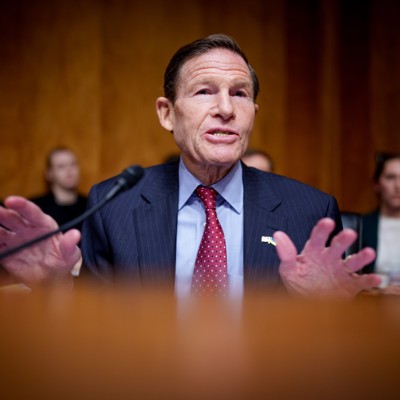Sen. Richard Blumenthal, D-Conn., thinks that the Veteran Affairs Department is moving too slowly in its efforts to implement legislation signed into law in January.
Blumenthal, the ranking member of the Senate Veterans’ Affairs Committee, aired his concerns that the department dragging its feet in implementing the Senator Elizabeth Dole 21st Century Veterans Healthcare and Benefits Improvement Act (S. 141) — which addresses home care and caregiver programs offered by the VA, both institutional and noninstitutional options — in a statement Monday.
The VA announced Monday that it would immediately implement a provision of the law that would remove a requirement for a second VA doctor to review and approve requests for non-VA provider care.
“Under President Trump, VA is providing Veterans with more health care choices than ever before,” said VA Secretary Doug Collins, in a statement. “Now, we’re making it even easier for Veterans to get their health care when and where its most convenient for them. We are putting Veterans first at the department, and that means placing a premium on customer service and convenience. This important change will help us do just that.”
Except that Blumenthal said Congress had mandated that the provision in question be implemented more than a month prior and took issue with the delay and what he said were more than a dozen provisions from the law that still aren’t enacted.
“Collins and the Trump VA are trying to take a victory lap for finally implementing a provision from the Elizabeth Dole Act they were required by law to put in place more than a month ago. Their delay is not a win—it’s a warning sign,” he said. “Dozens of other critical, time-sensitive provisions from this comprehensive, bipartisan law remain unaddressed. Whether Secretary Collins is willfully ignoring them or flagrantly failing to act, the result is the same: veterans are being shortchanged, and the law is not being upheld. This Administration’s half-hearted approach to implementing laws passed by Congress is unacceptable. Veterans deserve better.”
Blumenthal pointed to other provisions in the bill that he said remain unimplemented. Among them were increasing the expenditure cap for noninstitutional care alternatives to nursing home care, increasing the reimbursement rates for organizations providing housing and case management services to homeless veterans and reauthorizing direct care and services authorities started during the pandemic to support homeless veterans with ride share for health care appointments, landlord incentives for permanent housing and other items.
VA officials were unavailable for comment on Blumenthal’s remarks at press time.
Holmes Norton tries again to get an inspector general for TSP board
Del. Eleanor Holmes Norton, D-D.C., re-introduced legislation on May 13 to provide a layer of oversight to the Thrift Savings Plan.
The lawmaker brought back the Federal Retirement Thrift Investment Board Inspector General Act (H.R. 3364), which aims to establish an inspector general for the Federal Retirement Thrift Investment Board that oversees the 401(k)-style federal employee retirement plan.
The FRTIB is made up of a five-person board selected by the president, Speaker of the House and Senate Majority Leader and tasked with instituting policies and oversight of the Thrift Savings Plan over four-year terms, alongside an executive director selected by the board.
This is Norton’s third attempt at the legislation, which she first introduced in 2022 after the FRTIB rolled out a new recordkeeping system and faced subsequent service challenges. The previous two versions never made it out of committee.
“I frequently heard from constituents about many problems with the TSP system after it changed platforms in 2022, including discrepancies in account balances, difficulties accessing accounts, lost beneficiary information, and hours-long wait times for customer service,” Norton said in a statement. “While I am pleased that the widespread problems with the TSP’s online system have been addressed since then, the FRTIB should be held to the same standards of accountability as any other federal agency. Accountability mechanisms at FRTIB, including establishing an independent inspector general, are necessary to prevent a recurrence of similar widespread failures and ensure any future issues are promptly and effectively addressed.”
The bill has been referred to the House Committee on Oversight and Government Reform.







